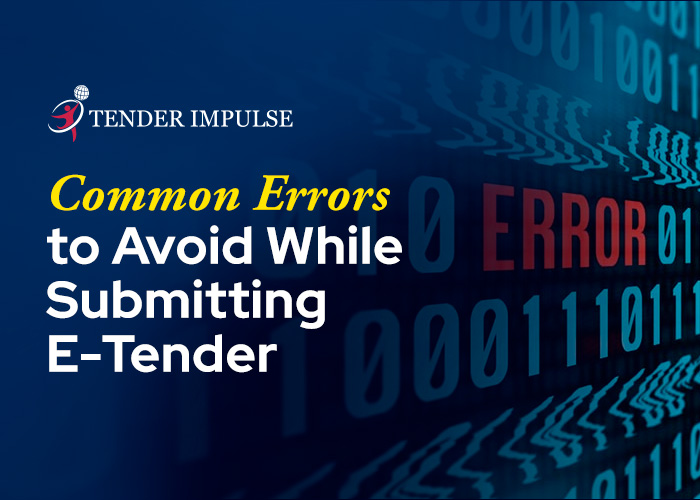The information age has seen new advancements in public procurement. Public procurement has gone electronic with the advent of self-service platforms used by procuring entities to purchase goods/services. Electronic tendering has taken away traditional paper based tenders and responses to RFP’s making it easier and convenient for companies to respond to more numbers of bids. On the other hand, it has improved transparency and decreased corruption amongst public officers making it the preferred medium of buying products and services globally. The competitive business landscape has almost made it mandatory for authorities and business organizations to switch to e procurement for streamlining their business operations. The ever increasing demand of electronic procurement has drawn attention to key details of most common mistakes that tenderers may make while submitting e-tenders. Although most electronic portals have a guide that they use to train the contractors, there is a lot of common mistakes that are identified while submitting bids via e-tender portals. In this article, we shall highlight the key mistakes that suppliers/businesses make in submitting electronic bids.
1. Updated Contractor Profile:
One of the first and foremost things to do while applying in electronic tenders is to create a contractor’s profile on the electronic platform. Most electronic platforms require contractors to create a contractor profile since these platforms allow you to bid via that single profile. While making a contractor profile, companies must fill in all the necessary information even if it might not be a mandatory field. This shall allow maximum exposure of company information to the authorities. Although this cannot determine tender results, it is very professional to do so. Companies must fill in as much information as it gives an indication of preparedness and willingness to join a project released by the authorities.
2. Interaction with Purchasers
Since all electronic tenders happen via a web portal, it is important that businesses do not forget the need to interact with the end buyers. Although the process is conducted electronically, efforts must be made to interact with the buyers via email or any other contact details provided. This shall give a leeway to the buyers and get the company noticed in the eyes of the buyer. Although in person meeting arrangements are limited by most authorities, it is still a traditional and nice way to keep them informed about your presence and keep in touch regarding future projects.
3. Attending Pre-bid conferences:
Some tendering procedures conduct an online or an in-person pre-bid meeting conference. Although it is not mandatory to attend such conferences, it is always a good idea to make your presence felt in such events. This is an opportunity to meet the buyers and showcase your products and stand out from the competition. Ultimately, it must be realized that a tender is a business agreement that happens between two entities even though the medium for the proceedings is online but the people involved are real and hence human interaction is very important.
Moreover, it also gives a chance to connect with competitors who may want to liason on a large project. Liasoning through pre-bid conferences is a great way as both the parties involved are already aware of the project and its technical details. Therefore, one of the grave mistakes that tenderers may make is to skip a pre-bid conference when it’s not mandatory.
4. Ignoring/Overlooking Key Questions:
During an Etendering process, various documents are submitted to the authorities. Documentation is a key part of the due diligence carried it by the authorities before granting the contract. In doing this, some of the documents may contain questions that might seem unimportant. However, it is a bad practice to ignore questions posted by the authorities as it negatively impacts the image of the participating company/business. Ignoring questions or not answering all questions is a sign that the company is not fully prepared or is being secretive. In a public bidding process, one of the key components is to maintain complete transparency with the authorities. Therefore, ignoring or overlooking questions is a red signal and must be avoided. In fact, the thumb rule is better; if more documents are presented, it is always better.
5. Submitting Late bids:
Companies are often tempted to think and mull over certain elements of an etender delaying the process of submission of bids. Although the electronic system sets a deadline after which companies may not be able to contest, it is still a good idea to submit the bids well in advance to avoid last minute panic and complications. One of the key things to understand in an etender is that late submissions or modification of a submitted bid is generally not allowed.

Thus, teams must collaborate internally to fill the different aspects of the bid and submit them before time. These different aspects must be synchronized with each other to make for a compelling bid and one that reflects on the questions posted by the authorities. It is always a good practice to divide different aspects of the bid into different teams. Doing this enables speedy responses and gives a more presentable bid.
The above takeaways are a good head start for companies looking to respond to tenders using electronic platforms. It is always a good idea to take help from an external service provider or a tender information provider who can aggregate the tenders from a specific geography/municipality so that the opportunities do not go unnoticed. Doing this will also save much time and effort that goes into searching for bids online. The service providers like Tender Impulse also help in creating state of the art contractor profiles with top public procurement authorities thereby allowing you to focus on the technical aspect of the bid and submission by avoiding the above mistakes. This article thus gives a good insight into the major errors that coincide with the errors that companies make while entering into the public market. By analysing the errors mentioned above and reducing it, companies stand a fair chance to get positive responses from authorities.




